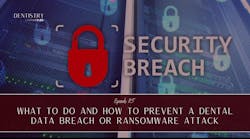The critical importance of data backup for dental offices
In today's increasingly digital world, dental practices rely heavily on technology to manage patient records, scheduling, billing, and imaging, but relying on digital tools begets a significant responsibility: protecting the vast amount of sensitive data your practice collects and stores. Data backup is no longer optional-it's essential. A robust backup strategy not only safeguards against data loss but also ensures business continuity in the face of cyberattacks, natural disasters, or system failures.
For dental offices, a comprehensive backup solution should include two key components: a local image backup of your server and an offsite cloud backup. Together, these components keep your practice secure and protected from every angle.
Why dental practices are a prime target
Dental practices are particularly vulnerable to cyberattacks because they handle a wealth of sensitive patient data-names, addresses, health history, insurance information, and even payment details. This data is a goldmine for cybercriminals. Unlike large health-care systems with dedicated IT departments and robust security protocols, small dental practices often lack the resources or expertise to defend against ransomware and other threats.
Whether it's a malicious attack, accidental deletion, a fire, or hardware failure, losing access to patient data can grind your practice to a halt. Worse, it can lead to HIPAA violations, legal liabilities, lost revenue, and irreparable damage to your reputation.
Local image backups: The first line of defense
A local image backup creates a full snapshot-or image-of your server, including the operating system, applications, settings, and all your data. This isn't just a file copy; it's an exact replica of your entire system. If your server crashes or becomes infected with ransomware, an image backup allows for quick recovery to the exact state your system was in at the time of backup.
Benefits of a local image backup:
-
Rapid recovery: You can restore the entire system within hours, not days.
-
Minimal downtime: Critical for dental offices where even a single day of downtime can mean lost revenue and frustrated patients.
-
Cost-effective: Local storage options are relatively inexpensive and easy to implement.
-
On-site control: You have immediate access to backups without relying on internet bandwidth.
However, this measure alone isn't enough. What happens if your server room floods? Or if a fire damages both your production system and the backup drive sitting next to it? That's where cloud backups come in.
Cloud backups: Your offsite safety net
Offsite cloud backups store encrypted copies of your data in secure, geographically diverse data centers. They add a critical layer of protection in case your local backups are compromised or inaccessible. A proper cloud backup solution ensures your practice can still recover even in the event of a physical disaster at your office.
Why cloud backups matter:
-
Disaster recovery: Fire, theft, flood, or power surges won't affect cloud backups.
-
Geographic redundancy: Data is stored in multiple locations for extra protection.
-
Scalability: As your data grows, your storage capacity grows with it.
-
Automatic scheduling: Regular, automated backups reduce human error and ensure consistent protection.
-
HIPAA compliance: Most reputable cloud providers offer encryption and access controls to meet compliance requirements.
It's important to choose a cloud provider that specializes in health care or dental IT and understands the unique compliance needs of your practice.
The three-two-one rule
A widely recommended approach to data backup is the three-two-one rule:
-
Three copies of your data (one primary plus two backups)
-
Two different media (e.g., local drive and cloud)
-
One copy offsite (e.g., cloud storage)
This approach minimizes risk and ensures you're protected no matter the circumstance. For dental practices, this might mean storing your practice management data locally on an image-based backup appliance and then sending nightly encrypted backups to the cloud.
The cost of doing nothing
It's easy to delay investing in a backup solution, especially if you haven't experienced a major outage or data loss before. But data breaches are costly, and ransomware attacks can leave practices unable to access patient charts for days or even weeks. Additionally, HIPAA penalties for improperly handling data can be severe and ongoing.
When you compare these potential costs to the relatively small investment of a proper backup solution, the decision becomes clear.
Partner with experts who understand dental IT
Data backup isn't one-size-fits-all. Your backup strategy should be tailored to your specific practice size, technology stack, and compliance requirements. Partnering with an IT provider who specializes in dental practices ensures you get the right solution with ongoing monitoring, testing, and support.
Don't leave your data-and your practice's future-to chance. By implementing both local image-based backups and secure cloud storage, you'll protect your patients, comply with HIPAA, and ensure your practice can recover quickly from any crisis. Peace of mind, after all, is priceless.
Editor's note: This article originally appeared in DE Weekend, the newsletter that will elevate your Sunday mornings with practical and innovative practice management and clinical content from experts across the field. Subscribe here.
About the Author

Lorne Lavine, DMD
Lorne Lavine, DMD, founder and president of The Digital Dentist, has more than 35 years in the dental and dental technology fields. He established TDD, a company that focuses on the specialized technological and HIPAA needs of the dental community, in 2002. As a consultant and integrator, Dr. Lavine has extensive experience with most practice management software, image management software, digital cameras, intraoral cameras, computers, networks, and digital radiography systems. He writes for many industry publications and lectures across the country. He is also the former technology consultant for the Indian Health Service.


